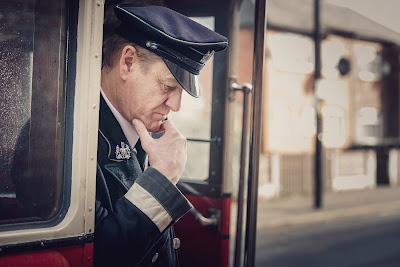This post is written by our
monthly correspondent, Lee Liberman
Writer *Peter Bowker, below, picks up and puts down (over and over) every piece of the WWII puzzle as Hitler clamped his vice on Europe starting 1939. We are in on the ruin/submission of Poland, the blitzkrieg through Holland, Belgium, France, and exodus from Dunkirk. The reason this big paint-by-numbers thing works is that some characters and intertwining predicaments are so quirky and well-written they jump off the screen; you keep watch to find out how the people-in-chief are faring in the jumble of puzzle. The relentless jerks between scenes are near fatal annoyance but not quite.
From our English homebase in Manchester, there’s well-to-do young Harry — dimpled pretty-boy (Jonah Hauer-King) who has mushy intention and not much charisma. His mother, Robina, is a major player, her caustic tongue having reduced the bon mots of Violet, Duchess of Grantham, to ciphers. Robina, played by the accomplished Lesley Manville, social-climbs her way through life with a case of the nasties, disinterested in politics except for her crush on the swaggering Oswald Mosley (real), far-right heretic of the 30’s (and Tommy Shelby’s obsession in Peaky Blinders). We watch a smidgen of kindness leak through Robina’s elitist pronouncements as time goes on (Harry is top photo, center; Robina, five photos below).
Douglas (Sean Bean), playing against heroic type, is working-class bus-conductor, Douglas Bennett, a shambling pacifist still suffering from WWI (above). His daughter Lois, factory-worker-cum-singer is Harry’s girlfriend (Julia Brown), much to Harry’s striver-mother’s annoyance; Douglas’s son is ne’er do well (‘bloody nuisance’) Tom, played by charmer, scene-stealer Ewan Mitchell.
This player and this part are the perfect blend of actor and writing; Mitchell shines as a scrappy sailor (above) full of sea adventures, scrapes, near misses. We last see him fleeing occupied France to Spain on foot and hope for more mischief as the war rolls on.
Back to the front, Harry is sent to Warsaw as a translator for the British embassy and there romances lovely waitress girl-next-door Kasia (Zofia Wichlacz) above, whom he marries on urgent advice: It’s not about which girl he loves most, but saving this girl’s life as Nazis rage across Poland. Kasia takes her little brother Jan to the train (below) and shoves him on board into Harry’s arms, begging Harry to save him not her.
Kasia joins the Polish resistance, partnering with one of WOF’s incidental Jews, Tomasz, to seduce Germans (preferably officers) one by one into a dark alley and shoot them — a lethal tag team until their luck runs out. In Manchester, little brother Jan is now living with Robina who hates mothering (below) adding a war-orphan story and immigrant bullying to the tabletop puzzle.
Lois meanwhile is entertaining the troops (Ms Brown, below, does her own singing), pregnant by Harry (losing her virginity was a piece of life business— now she’s done with him), and being pursued by ace pilot, Vernon, who loves her, even ‘up the duff’ with Harry’s baby.
Our mellifluous-voiced, conscientious radio-caster is Edward-R-Murrow-esque correspondent, Nancy Campbell — token American (Helen Hunt, third from left, cover photo). She narrates Hitler’s stealth build-up on Poland and the blitzkrieg across Europe. Nancy is the glue among major characters and some lesser ones such as a gay black jazz musician (on the Nazi hit list for being all three) and his white American doctor lover, Nancy’s nephew. This couple (below) dares a moment too long.
Nancy’s Berlin neighbors, whom she is drawn to help, fatally, are a ‘good’ German family with an epileptic child who must be hidden from the sorry Nazi scheme of purifying the race by killing the disabled. And to belabor the shell-shock narrative a lot more, we accompany Harry as he minds a truck load of mentally-damaged soldiers on the road to Dunkirk. Back home in Manchester, Douglas takes little Jan to the local mental hospital to reunite with his (and Kasia’s) brother Grzegorz, who, having joined a troop of English soldiers and escaped to England via Dunkirk, is hospitalized, suffering the same mistreatment for PTSD that afflicted Douglas at the Somme.
The strange entanglement of Douglas and Robina (below) is something to watch— grandparenting a bastard baby from opposite ends of the social divide (her McMansion/his worker row house). Robina is still minding Polish Jan. (Robina tells Lois: "If I had known Harry was going to marry a Polish waitress, I’d have thought you more of a prospect.") Douglas quietly becomes uncle-grandpa to Jan — playing ball and chess with him. Since Harry loves both Lois and Kasia, the messiness between these two families is sure to get messier. I’m rooting for Kasia, but Douglas and Robina?
We are left with a major cliff-hanger: Handsome Harry has parachuted back into Poland on a spy mission; he makes his way to a safe house of Polish fighters where amazingly Kasia turns up (having fled the scene of her hanging as bombs fell). The Polish resistors are found by the Germans at that moment; Harry and Kasia are on the run, heading into the second year of the war (1940) and the second series, already scheduled. There are doubtless dozens more WWII memes to overwork —trains, camps, slave labor, battles, etc. — all of which we will watch to find out whether Harry outgrows callow youth and/or bumbles his way to Kasia or Lois.
I see Peter Bowker’s bind — he can’t show every Nazi trope in the war and develop interesting characters without all those leaps among scenes. But other series manage smoother transitions, and scoring memes feels like a vanity project. Maybe he could edit the scope — his characters deserve it and his audience already knows what the Nazi’s did.
*Note: See a BBC interview with Peter Bowker
in which he notes his own issues with structure.














No comments:
Post a Comment